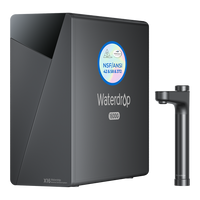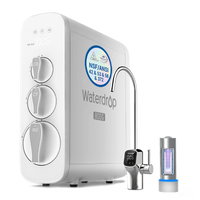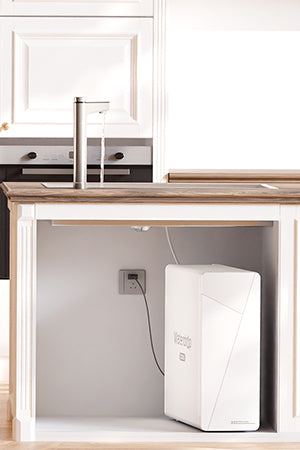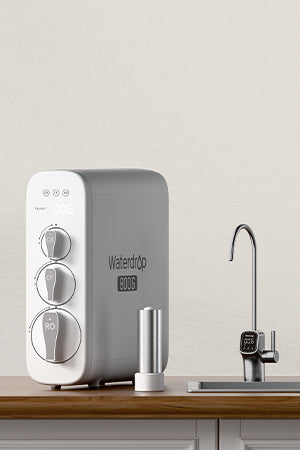When it comes to boiling water for cooking, tea, or coffee, Canadians often wonder: Does cold water boil faster than room temperature water? It's a common kitchen question, passed down through generations, but the answer might surprise you.
In this guide, we'll explore whether cold water really boils faster, the science behind boiling, and common myths. We'll also answer related questions Canadians often ask about boiling water. Plus, we'll explain why water quality matters when boiling water, and how systems like Waterdrop water filters can make a difference.
Does Cold Water Boil Faster?
The simple answer is no. Cold water does not boil faster than room temperature water.
Boiling point is the same for both cold and room temperature water (212°F/100°C at sea level). If you start with cold water, it has to heat up from a lower temperature, which takes more time. Room temperature water is already closer to the boiling point, so it boils faster.
Why Do People Think Cold Water Boils Faster?
This myth may have originated because people often notice water in different conditions reacting differently when heated. The following are a few more reasons why this belief exists:
The Mpemba Effect
Some experiments have shown that hot water can freeze faster than cold water under certain conditions. This unusual phenomenon may have caused confusion about boiling as well.
Perception of Time
When waiting for water to boil, people may not notice the actual starting temperature. Cold water can appear to heat up more quickly at the beginning, but in reality, it still takes longer to reach boiling.
Cooking Traditions
Some Canadian households were taught to use cold water for cooking pasta or boiling vegetables because cold water is generally safer from the tap. This might have led to the assumption that it boils faster, too. Most chefs and food experts recommend starting with cold water when cooking. Here's why:
-
Water Safety: Hot tap water can pick up more contaminants like lead from pipes or sediments in the water heater.
-
Better Flavour: Cold water helps ensure consistent cooking results.
-
Health Concerns: Older Canadian homes with lead pipes or outdated plumbing may release higher levels of metals into hot water.
How Long Does It Take for Water to Boil in Canada?
The boiling time depends on several factors:
Starting Temperature – Hot tap water may be around 50°C, while cold water is closer to 5–10°C in Canadian winters.
Altitude – Higher altitudes (like in
Alberta or
British Columbia's mountains ) lower the boiling point of water, meaning water boils at lower temperatures but may take longer to cook food.
Stove Type – Gas stoves heat water faster than some electric coil stoves. Induction stoves are usually the most efficient.
Pot Size and Material – Wide, thin pots heat faster than thick, tall ones.
On average, a litre of cold tap water in Canada takes 8–10 minutes to boil on a standard stove, while starting with room temperature water might reduce that by a few minutes.
Does Filtered Water Boil Faster Than Tap Water?
Technically, filtration doesn't change the boiling point of water. However, filtered water has advantages as following. So while filtered water doesn't boil faster, it is cleaner and tastes better.
-
Better Taste – Clean, reverse osmosis filtered water enhances tea, coffee, and cooking.
-
Less Residue – Hard water minerals create limescale buildup in kettles and pots. Filtered water reduces this problem.
-
Health Protection – Removes chlorine, lead, PFAS, and other contaminants sometimes present in Canadian tap water.
Why Should Canadians Consider Waterdrop Water Filters?
Clean water is the foundation of every meal and drink. For Canadians concerned about water quality, Waterdrop water filters are a practical choice.
-
Reverse Osmosis Systems – Remove up to 99% of contaminants, including lead and PFAS.
-
Space-Saving Design – Tankless under-sink filters fit Canadian kitchens with limited space.
-
Eco-Friendly – Reduces reliance on bottled water and cuts down on plastic waste.
-
Improved Taste – Makes boiled water taste fresher, ideal for coffee, tea, and cooking.
Whether you're boiling water for pasta or making tea on a cold Canadian morning, filtered water from Waterdrop ensures both safety and flavour.
What Is the Science Behind Boiling Water?
Boiling water involves heating until its vapour pressure equals atmospheric pressure, causing bubbles to form. At sea level in Canada, this happens at 100°C. At higher altitudes (Banff, Jasper, Whistler), water boils around 95°C or lower. This explains why cooking pasta or boiling potatoes may take longer in the mountains. The process is the same whether you start with cold or hot water—what changes is how long it takes to get there.
Does Salt or Sugar Make Water Boil Faster?
No. In fact, adding salt or sugar increases the boiling point of water slightly, meaning it takes longer to reach a boil. Adding salt when cooking pasta doesn't make it boil faster—it just improves flavour. Sugar in recipes like caramel actually requires higher boiling temperatures. So if you're looking to save time, keep the water plain until it starts boiling.
Does Boiling Tap Water Remove Contaminants?
Boiling water kills most bacteria and viruses, but it doesn't remove:
- Heavy Metals like lead
- Chemicals like PFAS or pesticides
- Chlorine Byproducts
- Microplastics
This is why Canadians who rely on well water or live in older homes may still need a water filtration system like Waterdrop, even if they boil water regularly.
How Can Canadians Save Time When Boiling Water?
- Use a kettle instead of a pot—electric kettles are faster and energy-efficient.
- Cover your pot with a lid to trap heat.
- Start with hot tap water only if you trust your plumbing and filtration system. Otherwise, use cold filtered water.
- Use a wide pot for faster heating.
Final Thoughts: Does Cold Water Boil Faster?
No—cold water does not boil faster than room temperature water. While many Canadians believe this myth, science shows that room temperature water reaches boiling point more quickly.
However, starting with cold water is safer for cooking and drinking, since hot tap water may contain higher levels of contaminants. To make sure your water is clean and healthy, a Waterdrop reverse osmosis filter is a smart choice for Canadian households.
Whether you're boiling water for pasta, coffee, or tea, starting with clean, filtered water ensures the best taste and peace of mind.










































































